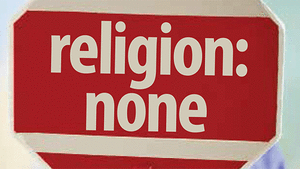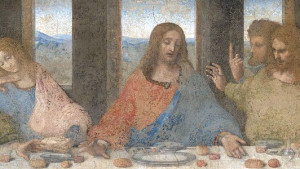"You are in charge of your life.” “Take responsibility for your happiness.” “Rely on the resources within you.” “Be all you can be.”
Over and over again we hear these catchcries, supposedly to focus our energies and centre our lives. Emanating from our market-driven Western culture, this message holds sway over the way we see the world and legitimises the values we are expected to affirm publicly.
In children's books, self-help literature, movies, economic theory, contemporary religious contexts, and national political strategies, we are taught that to be independent and self-made is to be a fulfilled human being. Independence is maturity, we are told. Meaning, support and safety are to be found in ourselves.
There is something right about this advice. These words can inspire and empower. But deep inside, we also feel there is something wrong. Self is not the whole story or even the main story.
That's why ancient writings are so relevant for spiritual seekers today. They provide us with a perspective on life outside the dominant view of the culture in which we live. We can stand on different ground, look at our lives and culture from outside, and see what shapes and moves us.
The Bible, for example, offers a time-tested and perhaps more adequate view of what it means to be fully human. Instead of telling us to retreat into ourselves, it sends us to others, telling us we have been made to live in community. It claims that merely becoming self-sufficient would not strengthen but diminish our lives.
According to this view of the world, it is relationships that are the glory of human existence. Our friendships, families, community groups, nations and humanity itself exist to give meaning, support and safety to our lives. Humans are never to be an aggregate of individuals, but a living body, interdependent on one another.
The Bible begins with a story of creation of the world in which humanity is described in its pristine innocence, harmony and beauty, before what has become known as “the Fall” altered the state of humanity. This story of origins is fascinating in what it says about human relationships. While all that was created, including the first man, was described as “very good,” the story describes Adam as lonely, incomplete and unhappy. In other words, Adam was not lonely because he was not perfect, but because he was.
There are two significant implications to this report. First, this is a story about the astonishing humility of God. God created us in a way that we will not be satisfied just with God. We need others. Second, when one is fully human, one feels the ache, the need, the want for others. While other aches in our lives result from something going wrong, the ache for others is a result of something going right. We are not a stone or a plant. We are created to feel lonely. That's why, according to the Bible, to be in need of others is a sign of spiritual maturity, not of spiritual weakness.
God placed this need for others in us, so we can be like God. Christians believe in God as Trinitarian—three in one. This mystery, however difficult to come to terms with, was embraced by Christians of the past because they recognised that no life God has put in motion is ever independent. What they discovered after reading and studying the Bible is that relationships are the glory of the universe. They realised God is a community, a community of One but a community nonetheless. And God said at the beginning, as recorded in the same report in Genesis: “Let us create a human being in our image.” Our need for relationships is after the divine image. To be is to be communal. The reality behind all of life is, in essence, not competitive, but cooperative.
For most people, relationships do not really last. They are not forever. When we die, we become either fertiliser in the cycle of life or an impersonal spirit, depending on the worldview to which one has subscribed. Even many of those who believe in one God hold that God began to relate only after creating. But if God is Trinity, if God's essence is a relationship, a community, then if anything is going to last forever, it is our friendships, God's essence in us.
And that's why God—a mystery who wants to be known to us—can only communicate this mystery through a Person. The chief contribution of Christianity to monotheistic religions is not sacred places, spiritual leaders, meaningful liturgy, a great vision for social justice, guidelines for a good life or even Holy Scripture. It is the embodiment of God's character in a Person. Instead of talking about how one is supposed to live, God lived in the person of Jesus Christ for the whole world to see. Jesus embodied what the Scriptures and prophets had been struggling to describe with mere words.
After Jesus completed His mission, He did not leave us with a book. Although Jesus was a learned Rabbi of His time, we know of no manuscripts either written or dictated by Jesus. Instead, He built a community. People He loved and taught continued to love and teach others, and that's how an extraordinary, counter-cultural, wholistic community was born. Considering that God and the reality He created are ultimately relational, to invest the whole future of His movement in people, however risky, was the only way He could communicate God's essence.
The wisdom of life with God is embodied in people, incarnated in communities of love. It is impossible to grasp Christian faith without seeing it embodied in a group of people. That's why belonging often comes before believing. Believing in God is difficult without belonging to a believing community. Faith must be relationally experienced in order to be considered and understood fully.
Although the word fellowship evokes an image of a church social in a run-down hall with people balancing foam cups and paper plates with food or perhaps a bunch of church ladies travelling in a church bus, fellowship goes far deeper into the meaning of vibrant human spirituality. Community is not a product of religion, a fruit of spiritual guidance, a desired result of people who know God or an appendix to the good news the New Testament talks about. It is the good news embodied, and good news fulfilled.
That's why, to love the world, God needs people. The early Christian community used a fish as a symbol by which Christians could communicate to each other that they belonged to one another, regardless of their gender, status or race. The Latin word for fish was ichthys, used as an acronym for “Jesus Christ, Son of God, Saviour.” Jesus embodied God's need for people, taught them about the interdependence of all human beings, and laid down His life for the sake of these relationships. In the kingdom of God, to be is to be in community.
We do not live in our own parallel universes, each one saying, “I can be whatever I want to be.” Each one of our dreams involves other people. Doctors need someone to clean the office, artists need someone to mix the paint and all of us need someone to drive the bus. If we are not happy until we become “what we want to be,” then this earth will be a place of competition, where self is paramount, and no-one is truly happy.
We don't want to be mere individuals, each one of us imprisoned in our mini-kingdoms. Our private worlds are intertwined and for the universe to work, we are invited into Jesus' school of life to learn that there is much more to life than self-fulfilment.
Many of us are on a spiritual search, seeking for a way to become fully human. It is never going to happen without a community. To be is to belong to each other.





